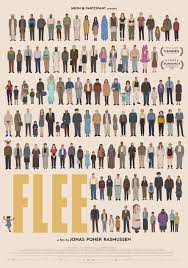
FLEE
Denmark, 2021, 89 minutes, Colour.
A film about refugees from Afghanistan, its release made more poignant by the collapse of Kabul and the taking over the country by the Taliban in 2021.
This is a striking film, Oscar-nominated in three categories: Best Documentary, Best Animation, Best Foreign Language Film. And it has won quite a number of nominations and awards in festivals.
But the refugee at the centre of the story, Amin, takes us back to 1984, some seemingly ordinary life in the capital, an amount of freedom. However, the monarchy has been previously toppled, the Mujahadin are exercising power, there is the Communist influence. Amin’s father is arrested, imprisoned, disappeared. His family suffer oppression, an older brother drafted to the military but escaping, the family relying on help to escape to Moscow. By the mid-90s, after years in Moscow, Amin leaves Russia, with the help of a refugee trafficker, a teenager finding that instead of going to Sweden to meet with his brother and family, he is sent to Denmark, having to keep quiet about his identity, a fabricated story about the death of the rest of his family, something that he conceals for many years.
While we might say that this is a familiar enough story, repeated over the decades and relevant to 2021, it is the way that the story is told that continually demands our attention, keeps us fascinated.
While there is a voice-over from Amin, narrating his story throughout the film, the visual method used is that of animation. The style is direct and broad, bringing to life the many episodes in Amin’s life, as a little boy (prone to wear his sister’s dresses), playing in the streets, his home life, the older sister telling heroic stories about their father, then the arrest, imprisonment, oppression and fear, the effect on the mother and her going prematurely grey.
This animation device means that we probably pay more attention to Amin and his story than we might have in a direct biographical documentary. The narrative has its moments of pain, uncertainty, relief.
Intercut with Amin telling his story is the revelation that until now, even with friends and his partner, he has not revealed the truth, that his family are still alive. The director has him lie down on the carpet, interviews him like a psychologist, eliciting more and more truth from Amin.
We also learn that Amin has had a successful life, an academic career, time in the United States. He also reveals his sexual orientation, his uncertainties, the grim view of homosexuality in Afghan society, the family accepting him as he was. And, there is relationship with his partner, the buying a house, settling down, moving in, a wedding ceremony.
The animation is made all the more effective because of the wide range of newsreel and television footage inserted, bringing a heightened sense of reality to situations in Afghanistan, war, suffering and escape.
A moving story inviting audiences to be more understanding and sympathetic to refugees and appreciate what they have experienced and suffered.
- Title, the direct? Refugees? The history of Afghanistan in the late 20th century? 21st-century?
- A biographical portrait, Amin and his voice-over, telling his story? The use of animation, style, characters, situations? Bold and direct? Colour? The insertion of newsreel footage, making a highlighted contrast with the animation? Overall impact?
- Amin, his relationship with the director, the interviews, discussions, Amin and gradual self-rvelation, when he was ready? His lying on the carpet, the director like a psychologist? Telling his story as therapy?
- Amin as an adult, life in Denmark, studies, his career, the United States? Relationships, his sexual orientation, his partner, separations, the buying of the house, setting it up, settling down, the marriage?
- Kabul, 1984, memories of family life, parents, brothers and sisters, the older sister and the heroic stories of her pilot father, Amin and his wearing the dress and this being taken for granted, bond with his brother? His mother? The change of government, the Mujahadeen, the father taken, imprisoned, disappearing? The consequences for the family? His brother in the military service, escaping?
- The political orientation of the government, the family and their fleeing to Moscow, the years in Moscow, concealed? Amin growing up? His mother and her grey hair? The possibilities for getting out of Russia?
- The people smugglers, the deals, money, the decisions about who should escape? The older brother and his family in Sweden? The decision for Amin to go?
- The trafficking, the smuggler and his demands, creating the story, no family? The two boys and their travelling, Amin reflecting on the attraction to the young man, in the truck, the planes, Amin going to Copenhagen, in the airport, refugee status, telling his orphans story, his being accepted? Eventually ringing his brother?
- Amin and his life in Denmark, fearful of being picked up and deported, staying to his story, no revelations?
- The visit to his brother, the pestering about having a girlfriend, his confession to the family, his brother taking him to the club, the background of homosexuality in Afghanistan, no name, not talked about, disgrace?
- The passing of the years, the discussions with the film director, the decision to make the film?
- Portrait of Amin, portrait of a refugee, the past in Afghanistan, freedom in Western Europe?